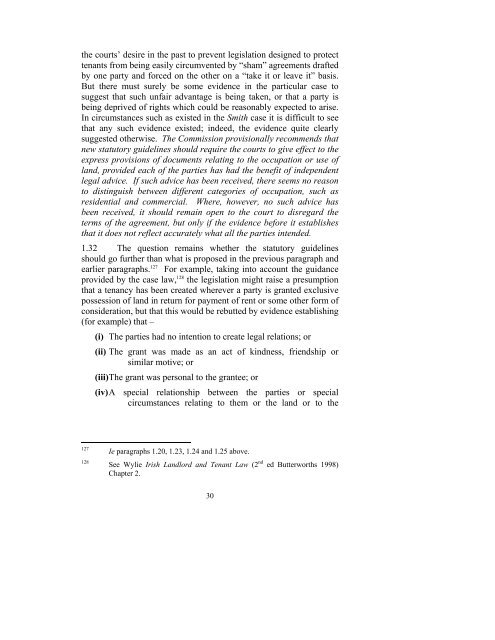Consultation Paper on the General Law of the Landlord and Tenant
Consultation Paper on the General Law of the Landlord and Tenant
Consultation Paper on the General Law of the Landlord and Tenant
You also want an ePaper? Increase the reach of your titles
YUMPU automatically turns print PDFs into web optimized ePapers that Google loves.
<strong>the</strong> courts’ desire in <strong>the</strong> past to prevent legislati<strong>on</strong> designed to protecttenants from being easily circumvented by “sham” agreements draftedby <strong>on</strong>e party <strong>and</strong> forced <strong>on</strong> <strong>the</strong> o<strong>the</strong>r <strong>on</strong> a “take it or leave it” basis.But <strong>the</strong>re must surely be some evidence in <strong>the</strong> particular case tosuggest that such unfair advantage is being taken, or that a party isbeing deprived <strong>of</strong> rights which could be reas<strong>on</strong>ably expected to arise.In circumstances such as existed in <strong>the</strong> Smith case it is difficult to seethat any such evidence existed; indeed, <strong>the</strong> evidence quite clearlysuggested o<strong>the</strong>rwise. The Commissi<strong>on</strong> provisi<strong>on</strong>ally recommends thatnew statutory guidelines should require <strong>the</strong> courts to give effect to <strong>the</strong>express provisi<strong>on</strong>s <strong>of</strong> documents relating to <strong>the</strong> occupati<strong>on</strong> or use <strong>of</strong>l<strong>and</strong>, provided each <strong>of</strong> <strong>the</strong> parties has had <strong>the</strong> benefit <strong>of</strong> independentlegal advice. If such advice has been received, <strong>the</strong>re seems no reas<strong>on</strong>to distinguish between different categories <strong>of</strong> occupati<strong>on</strong>, such asresidential <strong>and</strong> commercial. Where, however, no such advice hasbeen received, it should remain open to <strong>the</strong> court to disregard <strong>the</strong>terms <strong>of</strong> <strong>the</strong> agreement, but <strong>on</strong>ly if <strong>the</strong> evidence before it establishesthat it does not reflect accurately what all <strong>the</strong> parties intended.1.32 The questi<strong>on</strong> remains whe<strong>the</strong>r <strong>the</strong> statutory guidelinesshould go fur<strong>the</strong>r than what is proposed in <strong>the</strong> previous paragraph <strong>and</strong>earlier paragraphs. 127 For example, taking into account <strong>the</strong> guidanceprovided by <strong>the</strong> case law, 128 <strong>the</strong> legislati<strong>on</strong> might raise a presumpti<strong>on</strong>that a tenancy has been created wherever a party is granted exclusivepossessi<strong>on</strong> <strong>of</strong> l<strong>and</strong> in return for payment <strong>of</strong> rent or some o<strong>the</strong>r form <strong>of</strong>c<strong>on</strong>siderati<strong>on</strong>, but that this would be rebutted by evidence establishing(for example) that –(i) The parties had no intenti<strong>on</strong> to create legal relati<strong>on</strong>s; or(ii) The grant was made as an act <strong>of</strong> kindness, friendship orsimilar motive; or(iii) The grant was pers<strong>on</strong>al to <strong>the</strong> grantee; or(iv) A special relati<strong>on</strong>ship between <strong>the</strong> parties or specialcircumstances relating to <strong>the</strong>m or <strong>the</strong> l<strong>and</strong> or to <strong>the</strong>127128Ie paragraphs 1.20, 1.23, 1.24 <strong>and</strong> 1.25 above.See Wylie Irish <strong>L<strong>and</strong>lord</strong> <strong>and</strong> <strong>Tenant</strong> <strong>Law</strong> (2 nd ed Butterworths 1998)Chapter 2.30
















